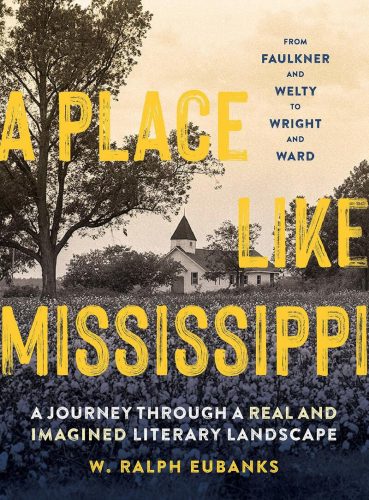Book Review: “A Place Like Mississippi” — The Home of a Sophisticated Multiracial Literary Culture
By Jim Kates
Literate people in the state will be familiar with this story, but it may come as a revelation to those whose Mississippi is limited to a cultural Bermuda Triangle on whose sharp angles sit William Faulkner, John Grisham, and Oprah Winfrey.
A Place Like Mississippi by W. Ralph Eubanks. Timber Press, 268 pages, $27.95
 For outsiders, the state of Mississippi suggests two very different images: on one hand, a thuggish white right-wing racism; on the other, a sophisticated multiracial literary culture that embraces subtlety, anguish, compassion, and interdependence.
For outsiders, the state of Mississippi suggests two very different images: on one hand, a thuggish white right-wing racism; on the other, a sophisticated multiracial literary culture that embraces subtlety, anguish, compassion, and interdependence.
It is this second image that reflects more accurately the Mississippi I know and came to love a half century ago. And that is the reality W. Ralph Eubanks guides us through in A Place Like Mississippi. Literate people in the state will be familiar with this story, but it may come as a revelation to those whose Mississippi is limited to a cultural Bermuda Triangle on whose sharp angles sit William Faulkner, John Grisham, and Oprah Winfrey.
Eubanks was born in Mississippi, left Mississippi, returned to Mississippi, and has written eloquently about that movement in Ever Is a Long Time. “It is common for Mississippi writers to experience alienation from the place they want to call home, yet how they confront that alienation and the cultural ecology of the state varies from writer to writer and evolves with each generation,” he writes in A Place Like Mississippi. In this book he celebrates the breadth and depth of the state’s rich literary landscape, moving north geographically from Biloxi to Memphis (yes, Memphis, TN, anchors the Delta on the North) and even reaching up to Chicago.
At the end of the 19th century,”regionalist” writing dominated American literature, and Mississippi writers of all genres have never let go of the individuality instilled by their physical and social geography. Writers of the 20th and the 21st centuries, according to Eubanks, “feel the need to describe the place with the greatest of intimacy yet in a way that makes what is unique about Mississippi resonate with an air of universality.”
Jesmyn Ward “feels connected to this land of sea and white sand” along the Gulf Coast. In Jackson, both Eudora Welty and Margaret Walker made agonized literature of the 1963 assassination of Medgar Evers. William Faulkner and the town of Oxford occupy the center of this book, as they do the literary imagination of the state. Oxford, too, is where Eubanks now lives. But the strength of his exploration is how it reaches southeast to Brad Watson in Meridian and west into a Delta rich in loam and lore, where writers as varied as the novelist Steve Yarbrough and the poet Etheridge Knight have come from. It may be particularly fitting that Eubanks ends A Place Like Mississippi with a profile of teaching Knight’s poetry in Parchman Prison, a sad emblem of the racist thuggery that dominates so much discourse about the state.
When I drive by Parchman — or any other prison in Mississippi or America, for that matter — I will … think of the inner lives of the men and women in prisons who are seeking redemption through writing … of their stories, which are Mississippi’s stories.
In a review like this, it makes no sense simply to plod name by name through all the territory Eubanks dances through. The alert reader may have noticed that I have quoted the verb “feel” more than once; and it is feeling more than academic survey that animates Eubanks’s appreciation. This is not an academic exercise. I could simply list the dozens of poets, novelists, and essayists who are surveyed here, but best to read the book, and use it as a list of writers who would supply a lifetime of rich discovery.
Not the least of the book’s value is in Eubanks’s succinct summaries of each writer’s individuality and their connection to their place. “For [Greg] Iles, the river town of Natchez embodies the unforgiving ways of the river that runs alongside it.” Larry Brown’s work “remains true to the part of rural Mississippi that shaped him.”
Perhaps most important, Eubanks doesn’t just look to the past of Mississippi literature:
Although reinvention and renewal represent part of the artistic vision of the work of Trethewey and Ward, both writers have been uniquely shaped by their geographic origins and surrounding landscape. Geography is both fate and literary inspiration. Natasha Trethewey and Jesmyn Ward are two writers who represent the future of Mississippi and Southern letters while maintaining a firm link into the past … defined on their own terms.
And so is W. Ralph Eubanks such a writer, we might add.
I keep for reference on my bookshelf a 1974 Atlas of Mississippi which details (according to its table of contents) the state’s physical features, history, population, social institutions, natural resources and resource utilization, transportation, communication, and manufacturing services, and a future perspective.
Next to it, as an equally necessary reference book, I am now going to put A Place Like Mississippi.
Jim Kates is a veteran of the Mississippi Civil Rights Movement, a contributor to the Mississippi State Museum of Civil Rights, and the editorial co-director of Zephyr Press, publisher of Letters from Mississippi, edited by Elizabeth Martínez.

I’ve lived in northeast MS for over 40 years and I couldn’t wish for a better place with with better people. Msm and social media like to try an divide us but it will take more then that to separate us. We respect each other no matter of color and treat people the way we would want to be treated. Its not the 1960s anymore and we dont act like it is.